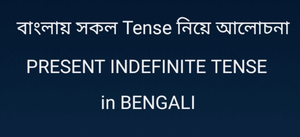এই পোস্টে PRESENT INDEFINITE TENSE ( in BENGALI ) নিয়ে আলোচনা করা হলো।
PRESENT INDEFINITE / SIMPLE PRESENT TENSE in Bengali
নিচের বাক্যগুলি লক্ষ্য করো:
আমি পঞ্চম শ্রেণীতে পড়ি – I read in class V.
রাহুল প্রতিদিন পুকুরে স্নান করে– Rahul bathes in the pond every day.
সূর্য পূর্বদিকে ওঠে – The sun rises in the east.
প্রথম বাক্যটি ‘সাধারণ ঘটনা‘, দ্বিতীয় বাক্যটি ‘অভ্যাস‘ এবং তৃতীয় বাক্যটি ‘চিরসত্য ঘটনা‘ নির্দেশ করছে। এইসব বাক্যগুলি Present Indefinite Tense.
কাকে বলে:
সাধারণ বর্তমানকালে কোনো কাজ করা হয় বা কোনো ঘটনা ঘটে বা কোনো অভ্যাস বা চিরসত্য ঘটনা বোঝাতে Present indefinite tense হয়।
চেনার নিয়ম:
এই ধরণের Tense এ বাংলায় মূল ক্রিয়া যেমন, যায়, খায়, করে, নাচে, পড়া করে ইত্যাদি থাকে।
গঠনের নিয়ম:
Present Indefinite Tense গঠন করার সময়, প্রথমে বাক্যের কর্তা অর্থাৎ Subject বসিয়ে মূল বা প্রধান ক্রিয়া অর্থাৎ Main Verb এবং তারপর বাক্যের বাকি অংশ বসাতে হয়।
সুতরাং আমরা জানলাম: Subject + মূল Verb + Others (বাক্যের বাকি অংশ)
Note: Subject যদি 3rd person singular number (He, She, It, Rahul, Mita ইত্যাদি) হয় তাহলে verb এর শেষে -s বা -es যুক্ত হয়।
Present Indefinite Tense in Bengali
উদাহরণ:
(a) রিনা গান করে – Rina sings.
(‘Rina’ 3rd person singular number তাই ‘sing’ verb এর সাথে –s যুক্ত হয়ে ‘sings’ হয়েছে)
(b) আমি বিকেলে খেলা করি – I play in the afternoon.
(c) ঘাস হয় সবুজ – Grass is green.
(d) তিনি একজন ডাক্তার – He/She is a doctor.
(e) পৃথিবী সূর্যের চারিদিকে ঘরে – The Earth moves round the sun.
(‘The Earth’ 3rd person singular number তাই ‘move’ verb এর সাথে -s যুক্ত হয়ে moves হয়েছে)
(f) মেয়েটি খুব ভালো নাচে – The girl dances very well.
(The girl তাই ‘dance’ verb এর সাথে –s যুক্ত হয়ে ‘dances’ হয়েছে)
(g) সে বিদ্যালয়ে যায় – He/She goes to school.
(‘He/She’ 3rd person singular number তাই ‘go’ verb এর সাথে -es যুক্ত হয়ে ‘goes’ হয়েছে)
** ** এই প্রসঙ্গে আরও বলে রাখি, না-বাচক (Negative) বাক্যের গঠন হবে:
Subject + do/does + not + মূল Verb
Note: Subject যদি 3rd person singular number (He, She, It, Rahul, Mita ইত্যাদি) হয় তাহলে Subject এরপর does বসবে। আর বাকি ক্ষেত্রে do বসবে।
না-বাচক (Negative) বাক্যের উদাহরণ:
(h) আমি মাংস খাই না – I do not eat meat.
(i) রাজু ধূমপান করে না – Raju does not smoke.
(j) তুমি ওখানে যেওনা – You do not go there.
(k) সে ক্রিকেট খেলে না – He does not play cricket.
Present Indefinite Tense in Bengali (বিভিন্ন ব্যবহার)
(i) General Time সাধারণ কাল
আমরা simple present স্থায়ী পরিস্থিতি অথবা যেগুলি প্রতিনিয়ত ঘটে বা অভ্যাস বোঝাতে ব্যবহার করি।
TIMELESS TRUTH:
The sun rises in the east. (সূর্য পূর্ব দিকে উদিত হয়।).
Sugar is sweet. (চিনি মিষ্ট।)
The earth moves round the sun. (পৃথিবী সূর্যের চারদিকে ঘোরে।)
Water freezes at 0° Celsius.
TEMPORARY HABIT:
I go to take cricket coaching every Tuesday.
HABIT:-
He often catches fish. (সে প্রায়ই মাছ ধরে।)
The boy usually studies upto late night. (ছেলেটি সাধারণত অনেক রাত্রি পর্যন্ত পড়াশোনা করে।)
I get up early in the morning. (আমি সকালে উঠি।)
We take tea everyday. (আমরা প্রত্যহ চা খাই।)
I go for a walk every afternoon. (প্রত্যহ বিকালে আমি ভ্রমণে যাই।)
Nabarun works in a factory.
The cock crows in the morning.
(ii) Series of Events (ঘটনা শৃঙ্খল)
ধারাভাষ্য বা demonstration বর্ণনার ক্ষেত্রে আমরা Present continuous-এর বদলে সাধারণ বর্তমান ব্যবহার করি।
We take two cups of water and boil it.
Tendulkar cuts it to short thirdman area and steals a quick single.
(iii) Historical Present (ঐতিহাসিক বর্তমান)
কিছু ঐতিহাসিক ঘটনা কখনও কখনও indefinite tense-এ ব্যবহৃত হয় যখন আমরা ঘটনাগুলি জীবন্তভাবে আমাদের চোখের সামনে ঘটছে বলে বর্ণনা করা হয়। এটি present tense যেটি অতীতকালকে বোঝাতে পারে।
Akbar faces the Rajputs.
Alexander invades India.
Shivaji now takes the enemy by surprise.
(iv) Conditional Future (শর্তসাপেক্ষ ভবিষ্যত)
শর্তসাপেক্ষ ভবিষ্যত বোঝাতে if, till, since, when ইত্যাদির সঙ্গে present indefinite ব্যবহৃত হয়। এক্ষেত্রে নিকটতর ভবিষ্যতটি সর্বদা present indefinite হয়।
I shall go to his house if he comes here.
We will tell you about it when we meet.
I shall wait till he returns.
(v) Near Future (নিকট ভবিষ্যত)
Simple Present Tense যে সমস্ত ভবিষ্যত ঘটনা আগে থেকে ঠিক করা সেগুলি বোঝাতে ব্যবহার করা হয়।
His train arrives at 10.15.
I start my new job tomorrow.
He starts for Delhi on Friday next.
(vi) Non-Progressive Verbs (Non-Progressive ক্রিয়া)
অনুভূতি বা বোধ বিষয়ক verb যেমন ‘see’, ‘feel’, ‘hear’, ‘want’, ‘wish’, ‘like’, ‘believe’, ‘hope’, ‘know’, ‘suppose’, ‘remember’, ‘forget’, ‘seem’ ইত্যাদি সাধারণভাবে continuous-এ ব্যবহৃত হয় না এবং এর বদলে সাধারণতঃ indefinite tense ব্যবহৃত হয়।
I like this cake very much.
I believe you. Shyamal knows English.
He wants ten rupees.
(vii) In Certain Structures
(a) ‘Here’ ‘comes…’ ‘There goes…’ ইত্যাদি কাঠামোয় Present indefinite tense ব্যবহৃত হয়।
Here comes my friend.
There goes our bus.
(b) With adverbs and adverbials
‘Once a year’, ‘every year’, ‘every week’, usually’, ‘other’, ‘occasionally’, ‘always’, ‘regularly’, ‘normally’ ইত্যাদি adverb বা adverbial-র সঙ্গে আমরা সাধারণতঃ বর্তমান কাল বোঝাতে Present indefinite tense ব্যবহার করি।
I never take tea.
He always speaks the truth.
He goes there once a year.
I go to temple on Sundays.
(viii) Imperative Sentences (আদেশসূচক বাক্য)
আদেশসূচক বাক্য সাধারণতঃ indefinite tense-এ ব্যবহৃত হয়।
Prepare your lessons.
Do your work.
(ix) Quotations (উদ্ধৃতি)
বিখ্যাত ব্যক্তি বা পুস্তকের কথা উল্লেখ করতে আমরা Present indefinite tense ব্যবহার করি।
Swamiji says, ‘Education is the manifestation of perfection already in man’.
The Bible says, ‘Love thy neighbour’.
Tense in Bengali:
| Present Indefinite Tense | Present Continuous Tense | Present Perfect Tense | Present Perfect Continuous Tense |
| Past Indefinite Tense | Past Continuous Tense | Past Perfect Tense | Past Perfect Continuous Tense |
| Future Indefinite Tense | Future Continuous Tense | Future Perfect Tense | Future Perfect Continuous Tense |
Also read: Present Continuous Tense in Bengali

